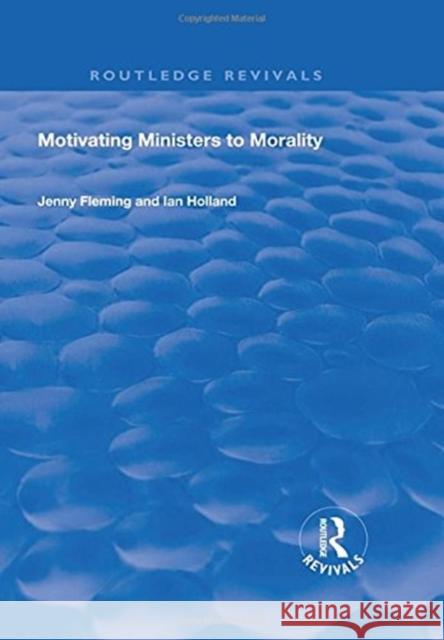Motivating Ministers to Morality » książka



Motivating Ministers to Morality
ISBN-13: 9781138704961 / Angielski / Miękka / 2019 / 252 str.
Motivating Ministers to Morality
ISBN-13: 9781138704961 / Angielski / Miękka / 2019 / 252 str.
(netto: 167,53 VAT: 5%)
Najniższa cena z 30 dni: 161,14
ok. 16-18 dni roboczych.
Darmowa dostawa!
This book discusses the most prominent subjects - and occasional victims - of the ethics debate: government ministers.
’This book is a stimulating and comprehensive international investigation of one of the major challenges to modern governments worldwide - regaining the public respect and authority lost by the real and perceived failures in ministerial accountability and by unethical practices in government. It should be read by anyone, both inside and outside government, interested in ways of improving ethical standards in public life. The authors, practitioners and public policy academics from a number of countries, combine informed case study analysis with penetrating discussion of the broader issues involved.’ Professor John Warhurst, Australian National University, Canberra ’The tabloid headlines scream sleaze. Are you tired of their hysterical claims? Ministers evade responsibility for their political and administrative failings? Are you tired of their special pleadings? Jenny Fleming, Ian Holland and their colleagues put the topic of ministerial ethics under the microscope, teasing out the tensions and contradictions inherent in parliamentary systems where party control buttresses executive power. They offer no easy institutional fixes, no unambiguous codes of conduct, but a welcome appreciation of the complexities of political life with an insistence on the need for a context which motivates ministers to meet public expectations about the right way to behave. If you crave dispassionate analysis on this overheated topic, look no further.’ Professor Rod Rhodes, Newcastle University, UK ’This edited collection is a great asset to political science and public administration and it should be incorporated into the must-read list for students studying political corruption.’ Governance ’Consistent quality across all sixteen chapters of the book means a useful addition to the existing literature on the ethical behaviour of political elites.’ Parliamentary Affairs '...the three overvies chapters that conclude the book are excellent in addressin
Ministerial Ethics - The Problem and the Theory: The case for ministerial ethics, Jenny Fleming and Ian Holland; Motivating ministers to morality, The Right Hon. Lord Nolan; Educating devils: theoretical reflections on ethics and governance, Haig Patapan. Lessons From Westminster: Codes and Conventions: The role of ministerial responsibility in motivating ministers to morality, Diane Woodhouse; Ministerial codes, cabinet rules and the power of Prime Ministers, Patrick Weller; Lessons from Westminster: the Scottish executive and new improved codes of conduct?, Mark Shephard. Walking the Tightrope: Serving the Party: Institutional weakness, ethical misjudgement: German Christian democrats and the Kohl scandal, Wolfgang Seibel; Problem or solution? the role of ministerial staff, Anne Tiernan. Ethical Vigilance: Watchdogs and Guarddogs: Honesty and corruption in the Canadian federal government: regulating ethics, Robert J. Jackson; Integrity and ministerial office: the Queensland integrity commissioner, Noel Preston; Conduct unbecoming: independent commissions and ministerial adversaries, Jenny Fleming; The role of the auditor general in scrutinizing ministerial ethics, John Wanna and Alexander Gash; Ministerial ethics and the media, Stephen Tanner. Motivating Ministerial Behaviour: Prior advice is better than subsequent investigation, Charles Sampford; Moderating ministerial ethics: putting political ethics in its place, John Uhr; Advancing ministerial ethics, Ian Holland and Jenny Fleming; Bibliography
Jenny Fleming is a Research Fellow in the Key Centre for Ethics Law Justice and Governance at Griffith University. She completed her doctorate at Griffith on public policy initiatives of new governments and is a former lecturer in the University's Faculty of Commerce and Management. Her research interests include party politics and the politics of criminal justice and police unionism, on which she has published widely. Ian Holland is a Research Fellow in the Key Centre for Ethics Law Justice and Governance at Griffith University. He was formerly lecturer in environmental policy and politics in the University's Faculty of Environmental Sciences. He has degrees from Sydney University, the University of New England and Griffith University. He has published on environmental policy and politics.
1997-2026 DolnySlask.com Agencja Internetowa
KrainaKsiazek.PL - Księgarnia Internetowa









